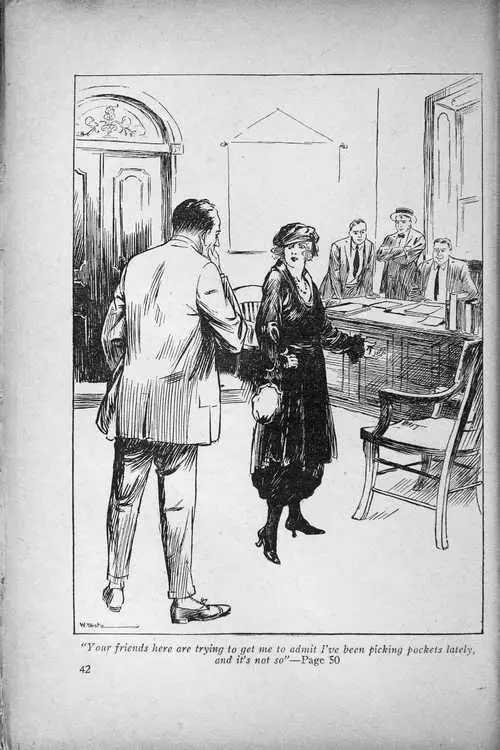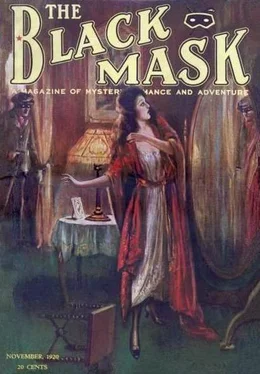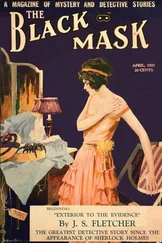Hamilton Craigie - The Black Mask Magazine (Vol. 2, No. 2 — November 1920)
Здесь есть возможность читать онлайн «Hamilton Craigie - The Black Mask Magazine (Vol. 2, No. 2 — November 1920)» весь текст электронной книги совершенно бесплатно (целиком полную версию без сокращений). В некоторых случаях можно слушать аудио, скачать через торрент в формате fb2 и присутствует краткое содержание. Город: New York, Год выпуска: 1920, Издательство: Pro-distributors Publishing Company, Жанр: Классический детектив, на английском языке. Описание произведения, (предисловие) а так же отзывы посетителей доступны на портале библиотеки ЛибКат.
- Название:The Black Mask Magazine (Vol. 2, No. 2 — November 1920)
- Автор:
- Издательство:Pro-distributors Publishing Company
- Жанр:
- Год:1920
- Город:New York
- ISBN:нет данных
- Рейтинг книги:5 / 5. Голосов: 1
-
Избранное:Добавить в избранное
- Отзывы:
-
Ваша оценка:
- 100
- 1
- 2
- 3
- 4
- 5
The Black Mask Magazine (Vol. 2, No. 2 — November 1920): краткое содержание, описание и аннотация
Предлагаем к чтению аннотацию, описание, краткое содержание или предисловие (зависит от того, что написал сам автор книги «The Black Mask Magazine (Vol. 2, No. 2 — November 1920)»). Если вы не нашли необходимую информацию о книге — напишите в комментариях, мы постараемся отыскать её.
The Black Mask Magazine (Vol. 2, No. 2 — November 1920) — читать онлайн бесплатно полную книгу (весь текст) целиком
Ниже представлен текст книги, разбитый по страницам. Система сохранения места последней прочитанной страницы, позволяет с удобством читать онлайн бесплатно книгу «The Black Mask Magazine (Vol. 2, No. 2 — November 1920)», без необходимости каждый раз заново искать на чём Вы остановились. Поставьте закладку, и сможете в любой момент перейти на страницу, на которой закончили чтение.
Интервал:
Закладка:
“The woman, Bill.”
Prosecutor Thornton threw up his hands in disgust.
“Bah! Two bahs! You’re crazy. There’s nothing to proceed on, man!”
“There’s what the reporters call the third degree.”
“Nothing doing, nothing doing!” Bill expostulated. “Whenever I have to become a bulldozer to accomplish my ends, particularly with a woman like Helen Lewis, why, somebody else can be prosecutor!”
“Then you don’t intend to do it?”
“No, I do not.”
“I’m afraid I can’t be of any more help to you, Bill.”
“Jim, it’s Said that whenever a man offers a wager to support his position, he has nothing more worthy to offer. But I’d stake my life on Helen Lewis’ fidelity, and I’m not going to besmirch her name.”
“I admire your chivalry, Bill, but not your professional acumen. I think I’ll be going.”
“All right, Jim. Time will tell. It usually does in such vital matters.”
“Bulldog” Dorgan departed, cursing under his breath such stupidity.
III.
Next morning Jacobsen sent in to the prosecutor a letter he had found among Mr. Lewis’ papers. Thornton called Dorgan at the home of his parents and asked if he would like to take a trip into the country. Dorgan accepted the invitation and they drove fifteen miles beyond Georgetown into the hills bordering the Ohio River.
The letter, written in a scrawling and illiterate style, and signed by George Morris, had been posted seven days before. It was very short and to the point, being, in fact, a threat that if Mr. Lewis did not restore five thousand dollars which Morris Claimed he was entitled to, he, Morris, would take steps to get it back.
With the letter in hand Thornton, accompanied by Dorgan, climbed a rock strewn hillside to the Morris house, a place badly in need of repair. It was patently not the home of a prosperous farmer.
George, a doddering old man, was amiable enough to his callers. He had not heard Mr. Lewis was dead, but was frank to say he was glad of it. He calmly admitted he had written to Mr. Lewis, explaining that some months before the bank had foreclosed without notice on an adjoining piece of land and sold it for five thousand dollars to a neighbor. He went on to say that following that his wife had died and now he was alone on his almost worthless patch of twenty acres or so. He said the foreclosure had brought on his wife’s death, and if Mr. Lewis had been lenient a little longer he would have been able to pay out.
“He got his just deserts, Lewis did,” the old man concluded in frenzied voice. “The ol’ skinflint!”
“How did you intend to recover from Lewis—what steps had you planned to take, like you mentioned in your letter?” Thornton questioned.
“Well, now, I don’t like to say, for mebbe I will want to do somethin’ yit,” Morris countered. “But I never had a mind to kill him.”
“Where were you night before last?”
“Up t’ th’ store.”
“Can you prove it?”
“Yes, sir; ’deed I can.”
And he did. Thornton and Dorgan learned from the proprietor that the old man had been there until nearly ten o’clock. Others corroborated this, and one man said he had ridden home with old George, helped him put up his horse and had walked on to his own home.
“Bum hunch,” Dorgan told Thornton. “He had nothing to do with it.”
“We’ll see, Jim.”
But on looking over the two bony animals Morris had in his tumbledown barn, the prosecutor decided that neither was capable of making thirty miles in a night. Besides, it seemed ridiculous, as Dorgan told him, to assume that old George, doddering as he was, had enough ingenuity to encompass such a robbery.
An unavailing search of the house and the barn for the money convinced Thornton that George Morris was guiltless.
The third day an inquest was held and the verdict left open. The fourth day Mr. Lewis and Harley were buried after an analysis of the vital organs of both had been made and developed nothing. Both were placed in the same plot in the Georgetown cemetery.
Police of Cleveland and other cities were unable to find anything to assist Thornton. A search among banking people at Cleveland failed to throw any light on Harley’s past. Several times Dorgan sought to convince Thornton that Mrs. Lewis should be grilled, but each time he met with rebuff. Thornton said he would take her word that she knew nothing about how the two men came to their deaths.
Finally, after ten days of useless rummaging, the prosecutor instructed the coroner to return a verdict of death from a broken neck, cause unknown, in the case of Harley, and from heart disease in the case of the banker. He had been unable to develop a lead worthy of consideration. The money was gone; if Harley and Lewis had died from unlawful causes, those causes probably would never be known.
Jim Dorgan returned to Chicago. But he did not forget the Georgetown mystery. He rarely ever forgot anything, and never wilfully cast a criminal subject from his mind. He almost took it as a personal affront that Thornton had disregarded his opinion. Relations had become a little strained between the prosecutor and himself toward the end of his visit, and it rankled in him that such a mystery should go unsolved and that Thornton should adopt what to him seemed a foolish attitude. It hurt his professional pride.
IV.
Chicago was in the throes of a crime wave. Murders, robberies and petty thieving were rampant. The order went out one night for a roundup. Every person of known criminal proclivities was to be brought in to make an accounting.
The fine-meshed seine caught, among others, “Limping Lizzie,” who had a string of aliases as long as a thoroughbred’s pedigree. Lizzie, known of old as a clever dip, was dragged from a cozily furnished apartment in the Twenties on the south side. The detectives who brought her in judged she must have been getting in some extremely profitable work recently, and they told Chief Burke so.
“Why, chief, that woman’s got swell furniture and rugs and curtains galore in her apartment,” Mercer reported. “Limpin’ Lizzie certainly has not been loafin’. Now, have you, E-liz-a-beth?” He turned to the girl with mock seriousness.
E-liz-a-beth was indignant. Her respectability was outraged.
“I have not been doing anything of the sort,” she answered hotly. “And you know I have not. You know you haven’t got a thing on me. I’ve been bothering no one fop—oh, well, for a long time.”
The chief laughed. So did the two detectives.
“Where’d you get all those swell rags you’re wearing?” Burke demanded.
“Why, I got an inheritance about nine months ago,” she declared.
“That’s good,” Mercer roared. “You’re there, Lizzie. Who was he and how did you work it?”
“You nut!” the girl cried, in sincere anger. “You nut! Let me go! I haven’t done anything to be hauled in here for.” She was talking loudly, in righteous indignation, and not in the suave, sweet way that had been hers when she had had dealings with the police on previous occasions.
Dorgan was attracted by her outburst and came and stood in the doorway of Burke’s office. He listened to her appeals.
“What’s the matter, Lizzie?” he finally interrupted.

“Your friends here are trying to get me to admit I’ve been picking pockets lately, and it’s not so. They won’t believe me when I tell them that I inherited some money recently. I have a letter to prove it.” She drew herself up defiantly.
“Well, where’s the letter?” the chief wanted to know.
Читать дальшеИнтервал:
Закладка:
Похожие книги на «The Black Mask Magazine (Vol. 2, No. 2 — November 1920)»
Представляем Вашему вниманию похожие книги на «The Black Mask Magazine (Vol. 2, No. 2 — November 1920)» списком для выбора. Мы отобрали схожую по названию и смыслу литературу в надежде предоставить читателям больше вариантов отыскать новые, интересные, ещё непрочитанные произведения.
Обсуждение, отзывы о книге «The Black Mask Magazine (Vol. 2, No. 2 — November 1920)» и просто собственные мнения читателей. Оставьте ваши комментарии, напишите, что Вы думаете о произведении, его смысле или главных героях. Укажите что конкретно понравилось, а что нет, и почему Вы так считаете.












